
South Tehidy is a hamlet north of Camborne in west Cornwall, England. [1]

South Tehidy is a hamlet north of Camborne in west Cornwall, England. [1]
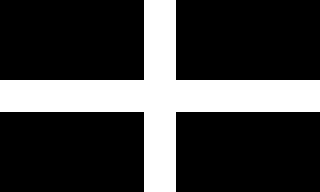
Cornwall is a ceremonial county in South West England, bordered to the north and west by the Celtic Sea, to the south by the English Channel, and to the east by Devon, the River Tamar forming the border between them. Cornwall is the westernmost part of the South West Peninsula of the island of Great Britain. The southwesternmost point is Land's End and the southernmost Lizard Point. Cornwall has a population of 568,210 and an area of 3,563 km2 (1,376 sq mi). The county has been administered since 2009 by the unitary authority, Cornwall Council. The ceremonial county of Cornwall also includes the Isles of Scilly, which are administered separately. The administrative centre of Cornwall is Truro, its only city.

Duke of Cornwall is a title in the Peerage of England, traditionally held by the eldest son of the reigning British monarch, previously the English monarch. The Duchy of Cornwall was the first duchy created in England and was established by a royal charter in 1337. The present duke is the Prince of Wales, the eldest son of Queen Elizabeth II. His current wife, Camilla, is the current Duchess of Cornwall.

The River Fowey is a river in Cornwall, England, United Kingdom.
A prince consort is the husband of a queen regnant who is not himself a king in his own right. In recognition of his status, a prince consort may be given a formal title, such as prince or prince consort, with prince being the most common. However, most monarchies do not have formal rules on the styling of princes consort, thus they may have no special title. Few monarchies use the title of king consort for the same role.
The Duchy of Cornwall is one of two royal duchies in England, the other being the Duchy of Lancaster. The eldest son of the reigning British monarch inherits possession of the duchy and title of Duke of Cornwall at birth or when his parent succeeds to the throne, but may not sell assets for personal benefit and has limited rights and income as a minor.
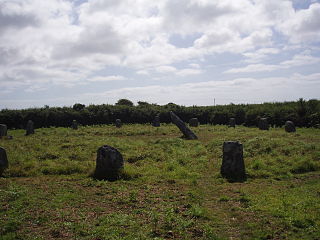
The history of Cornwall goes back to the Paleolithic, but in this period Cornwall only had sporadic visits by groups of humans. Continuous occupation started around 10,000 years ago after the end of the last ice age. When recorded history started in the first century BCE, the spoken language was Common Brittonic, and that would develop into Southwestern Brittonic and then the Cornish language. Cornwall was part of the territory of the tribe of the Dumnonii that included modern-day Devon and parts of Somerset. After a period of Roman rule, Cornwall reverted to rule by independent Romano-British leaders and continued to have a close relationship with Brittany and Wales as well as southern Ireland, which neighboured across the Celtic Sea. After the collapse of Dumnonia, the remaining territory of Cornwall came into conflict with neighbouring Wessex.

St Columb Major is a town and civil parish in Cornwall, England, United Kingdom. Often referred to locally as St Columb, it is approximately seven miles (11 km) southwest of Wadebridge and six miles (10 km) east of Newquay The designation Major distinguishes it from the nearby settlement and parish of St Columb Minor on the coast. An electoral ward simply named St Columb exists with a population at the 2011 census of 5,050. The town is named after the 6th-century AD Saint Columba of Cornwall, also known as Columb.

My Cousin Rachel is a 1952 American film noir mystery romance film directed by Henry Koster and starring Olivia de Havilland, Richard Burton, Audrey Dalton, Ronald Squire, George Dolenz and John Sutton. The film is based on the 1951 novel of the same name by Daphne du Maurier.
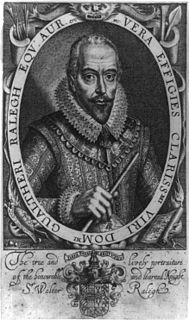
The Lord Warden of the Stannaries used to exercise judicial and military functions in Cornwall, England, in the United Kingdom, and is still the official who, upon the commission of the monarch or Duke of Cornwall for the time being, has the function of calling a stannary parliament of tinners. The last stannary parliament convened by a Lord Warden of the Stannaries sat in 1753.

An overlord in the English feudal system was a lord of a manor who had subinfeudated a particular manor, estate or fee, to a tenant. The tenant thenceforth owed to the overlord one of a variety of services, usually military service or serjeanty, depending on which form of tenure the estate was held under. The highest overlord of all, or paramount lord, was the monarch, who due to his ancestor William the Conqueror's personal conquest of the Kingdom of England, owned by inheritance from him all the land in England under allodial title and had no superior overlord, "holding from God and his sword", although certain monarchs, notably King John (1199–1216) purported to grant the Kingdom of England to Pope Innocent III, who would thus have become overlord to English monarchs.

The Cornish people or Cornish are a Celtic ethnic group and nation native to, or associated with Cornwall and a recognised national minority in the United Kingdom, which can trace its roots to the ancient Britons who inhabited southern and central Great Britain before the Roman conquest. Many in Cornwall today continue to assert a distinct identity separate from or in addition to English or British identities. Cornish identity has been adopted by migrants into Cornwall, as well as by emigrant and descendant communities from Cornwall, the latter sometimes referred to as the Cornish diaspora. Although not included as an explicit option in the UK census, the numbers of those claiming Cornish ethnic and national identity are officially recognised and recorded.

The Royal Cornwall Museum in Truro holds an extensive mineral collection rooted in Cornwall's mining and engineering heritage. The county's artistic heritage is reflected in the museum's art collection. Through the Courtney Library the museum also provides a collection of rare books and manuscripts to help with education, research and the discovery of Cornish life and culture.

The Cornish Gilliflower is a cultivar of apple.

My Cousin Rachel is a novel by British author Daphne du Maurier, published in 1951. Like the earlier Rebecca, it is a mystery-romance, set primarily on a large estate in Cornwall.
The Institute of Cornish Studies (ICS) is a research institute in west Cornwall, England, United Kingdom, affiliated with the University of Exeter. Formerly at Pool, near Redruth, then in Truro, it is now on the Penryn Campus near Penryn, Cornwall.
Philip John Payton is a British historian and Emeritus Professor of Cornish and Australian Studies at the University of Exeter and formerly Director of the Institute of Cornish Studies based at Tremough, just outside Penryn, Cornwall.

Cornish nationalism is a cultural, political and social movement that seeks the recognition of Cornwall – the south-westernmost part of the island of Great Britain – as a nation distinct from England. It is usually based on three general arguments:
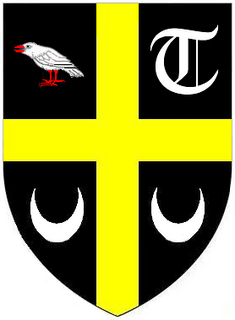
Philip Rashleigh III of Menabilly, Cornwall, was an antiquary and Fellow of the Royal Society and a Cornish squire. He collected and published the Trewhiddle Hoard of Anglo-Saxon treasure, which still gives its name to the "Trewhiddle style" of 9th century decoration.

Menabilly is a historic estate on the south coast of Cornwall, England, situated within the parish of Tywardreath on the Gribben peninsula about 2 miles (3.2 km) west of Fowey.
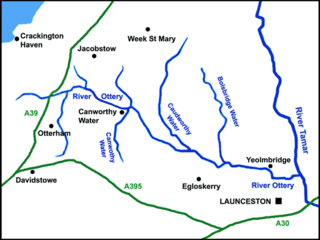
The River Ottery is a small river in northeast Cornwall, United Kingdom. The river is about twenty miles (32 km) long from its source southeast of Otterham to its confluence with the River Tamar at Nether Bridge, two miles (3.2 km) northeast of Launceston.
| This Cornwall location article is a stub. You can help Wikipedia by expanding it. |